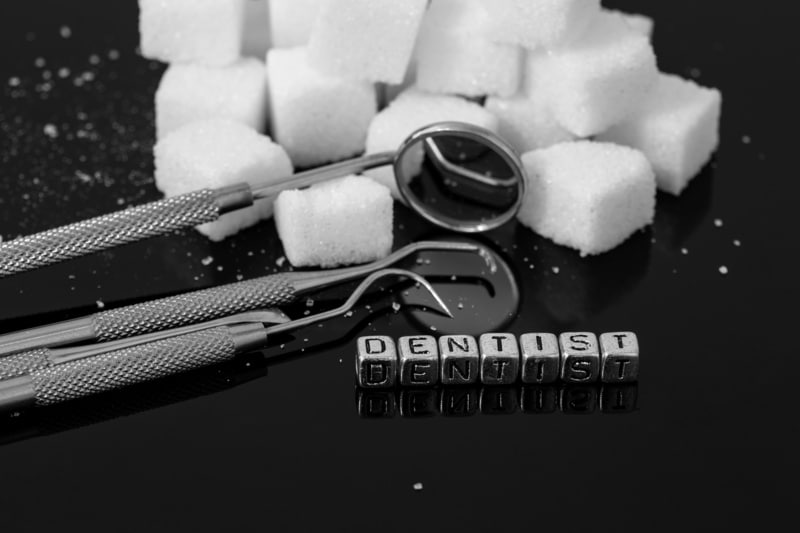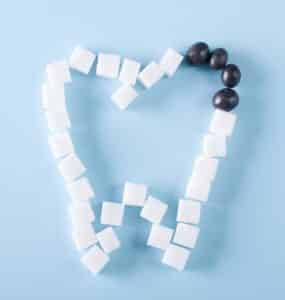More Sugar Means More Cavities


If you take a look at the food your child eats throughout the day, you might be surprised that the “healthy” foods you buy have more sugar than you might think. Not only can this damage their health over time, but more sugar means more cavities for your little one. Children should not consume more than 3 teaspoons of added sugar a day. However, children often are eating more than 20 teaspoons of the sweet stuff. It’s no wonder cavities are so prevalent in young children! Find out the facts about sugar, how they cause your child tooth decay, and why you should limit their sugar for better oral health.
Sugar Is Everywhere
When people start new diets, they tend to focus on cutting out foods with lots of fat or carbs. However, it’s the sugary foods that kill diets quickly. Sugar is not actually a nutrient you need in your diet. It provides no nutritional value, and actually can severely hurt your nutrition, not to mention your oral health. Studies show that sugar makes your body store extra fat than it otherwise would, and all over your body. A diet rich in sugar leads to chronic conditions like obesity, diabetes, heart disease, tooth decay and gum disease, to name a few. It affects your cholesterol, the amount of insulin in your blood, how good your skin looks and can even be addictive.
There is a reason that so many people crave the sweet stuff, as it can be addictive the more you eat it. Some studies show that it can be just as addictive as street drugs, or even more so. This is because when you or your child eats sugar, your brain releases chemicals from it’s pleasure center, causing you to feel good. Over time, you need more and more sugar to have that feel-good emotion. This is how a person’s diet can go from little sugar to high amounts of sugar over time. You may think you are also getting an energy boost from sugar intake—which can happen—but you are also crashing within a half hour of eating sugar. You don’t want all of these health changes in you or your child from something as simple as sugar. The problems are endless when it comes to sugar, and most people don’t even know! That is why there are health guidelines set for how much sugar a person should be having each day.

How Much Is Too Much?
You may think your child is eating healthy, but they may be consuming tons of sugar. Watch out for secret sugary foods such as bread (especially whole wheat bread), yogurt, granola bars, nut butters, milk, pre-packaged foods and more. The American Heart Association and many other health organizations have set sugar guidelines for you and your child. These guidelines help significantly reduce your child’s risk for chronic conditions and can save them from having many cavities that sugar causes.
The guidelines for each age group are:
- Men: No more than 9 teaspoons, which is 36 grams or 150 calories a day.
- Women: No more than 6 teaspoons, which is 25 grams or 100 calories.
- Children: Less than 6 teaspoons if you’re under 18 years.
- Newborns/Toddlers: 0-3 grams, or as little as possible.
Studies show that toddlers and children get between 12 and 20 grams of sugar a day and those between 18 and 25 get 34 grams or more a day.

More Sugar Means More Cavities
Why is sugar such a concern? Sugar is one of the leading causes of tooth decay and gum disease, which are some of the most prevalent chronic diseases among children and adults. Gum disease affects more than 64.7 million American adults alone, and many more people have tooth decay. When you eat, sugars in your food combine with bacteria in the mouth to form plaque. Your mouth makes this sticky, acidic substance every single time you eat. That means, the more sugar you eat, the more plaque you make. Plaque sits on your teeth because it’s so sticky and erodes your tooth enamel. If it sits there long enough, you will get cracks and open areas of your teeth, where plaque then gets inside your tooth and decays it. That decay is known as “cavities”, and cavities can lead to tooth loss.
Plaque also irritates your gums, causing them to become red, swollen, and to bleed easily. The gums try to get away from plaque, so they pull back (or recede). This can eventually lead to tooth loss. This is gum disease. You can significantly reduce your risk for cavities and disease by brushing and flossing your teeth several times a day, and especially after meals. However, not enough people brush and floss during the day—or at all—meaning that millions have cavities.
Reduce Sugar to Reduce Cavities
We urge every patient to have a set oral hygiene routine each day. The American Dental Association recommends brushing your teeth at least twice a day, if not more. If you tend to eat a lot of sugar, we urge you to brush 3 or 4 times a day and to come see us for comprehensive exams. Your best option to avoid cavities is to reduce the amount of sugar you eat, while brushing and flossing more often. If you want to know more about how sugar damages your teeth, or if you need help with your oral hygiene, call Dr. Ania’s office anytime at 303-443-0998!


